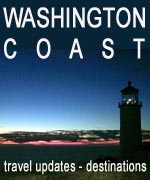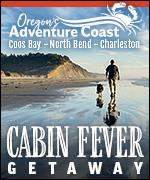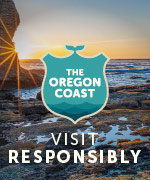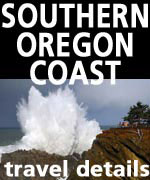When the Green Flash and Oregon Coast Whale Research Meet: Science Explanation
Published 5/03/24 at 3:35 a.m.
By Andre' Hagestedt, Oregon Coast Beach Connection
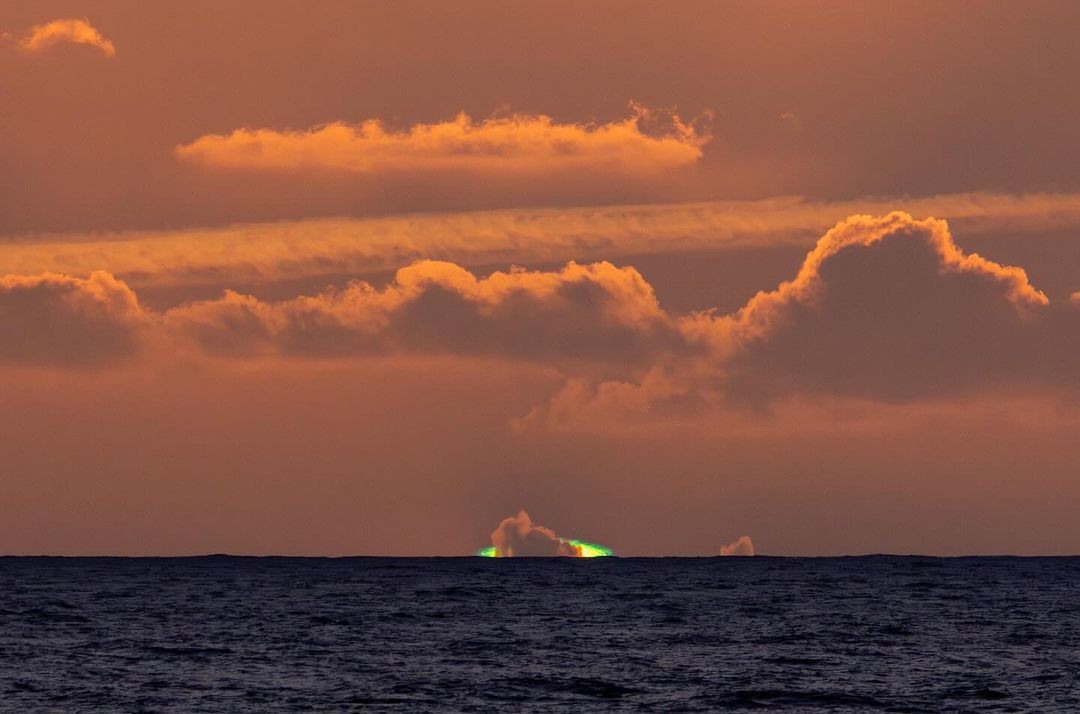
(Newport, Oregon) – One of the most sought-after sights on the Oregon coast and even Washington coast is catching a glimpse of the green flash at sunset. It's more common than not for visitors to line up along a beach view as sunset begins to try and see the famed, even elusive phenomenon. (Photo Craig Hayslip / Marine Mammla Institute / OSU)
Includes exclusive listings; some specials in winter
In Cannon Beach:
Includes rentals not listed anywhere else
In Manzanita, Wheeler, Rockaway Beach:
Some specials for winter
In Pacific City, Oceanside:
Some specials for winter
In Lincoln City:
Some specials for winter
In Depoe Bay, Gleneden Beach:
Some specials for winter
In Newport:
Look for some specials
In Waldport
Some specials for winter
In Yachats, Florence
Some specials for winter
Southern Oregon Coast Hotels / Lodgings
Reedsport to Brookings, places to stay; winter deals
What if, however, you're a whale researcher at sea? Does the green flash do its colorful thing for you and your crew? And if so, just what is the actual scientific explanation behind the green flash at sunset?
Craig Hayslip, Senior Faculty Research Assistant with the Marine Mammal Institute out of the Hatfield Science Center in Newport (Oregon State University), can answer the first question. He caught what is the money shot of the green flash on a research vessel on April 20. See Craig's Instagram photos
As for the science, the National Weather Service's (NWS) Brian P. Nieuwenhuis can delve into that. It's one of the few times anyone has obtained the explanation from an actual scientist out there. On top of that, it turns out t's related to another phenomenon known as the Novaya Zemlya effect which you see more often.
Haystlip was out at sea off Oregon's coast when he was snapping away at our star (called Sol, by the way) taking a dip into the ocean. He then caught one of the most striking shots of the green flash in recent years.
Lucky dog: apparently the crews of these vessels see them periodically – and most people only see it maybe once in their life.
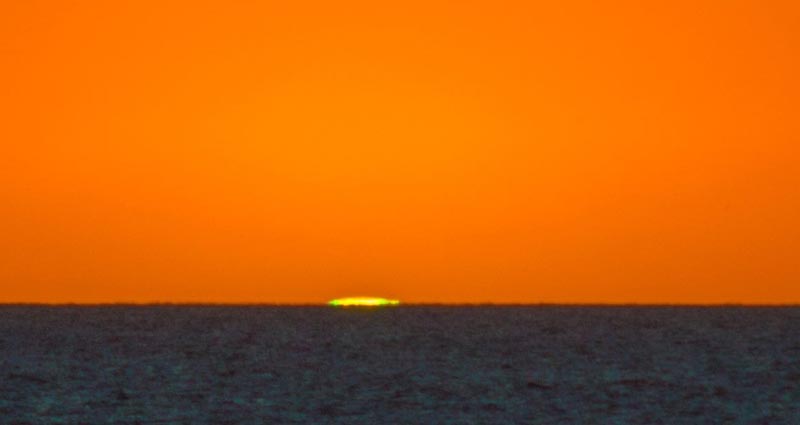
Phil Manoug of NOAA captured this one a few years ago
“We see a few out here but I see them from shore too. I don’t think being on the ocean or on shore makes a difference,” Hayslip told Oregon Coast Beach Connection. “For our current project, surveying for marine mammals and seabirds from Cape Mendocino to the Columbia River, we work from sunrise to nearly sunset, so often the sun is setting as we put our gear away. In this case I just stayed out a bit longer because it looked like it would be a good sunset and fair conditions to catch a green flash.”
The expedition was part of the MOSAIC Project, where scientists are examining the regional population of marine mammals and seabirds for the coming wind energy projects offshore.
The green flash can be a difficult one to see and even harder to photograph.
“I think most people miss the flash because it is so small,” Hayslip said. “This photo was taken with a 500mm lens and then cropped to bring out the size even more. It was unique to me because I had never had a cloud in front of the sun like this before. While on these MOSAIC project cruises I have probably only photographed a green flash 4 or 5 times. This is our 6th and last cruise and I have been on all of them as a marine mammal observer.”
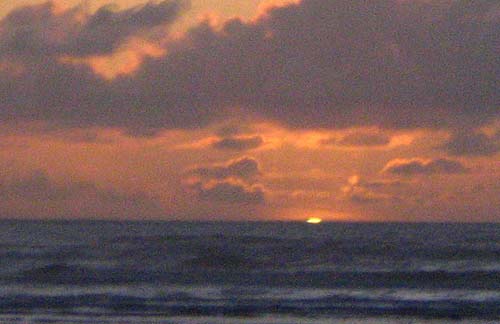
Green flash in Seaside / Oregon Coast Beach Connection
At one point, Hayslip and his fellow crew got even luckier: they spotted a few orcas out there the day before he caught the green flash. Since about then, local orca groups have been on fire with numerous sightings along this coastline.
So exactly what causes the green flash?
Nieuwenhuis is with the Medford office of the NWS and one of his specialties is marine weather.
“The Green Flash occurs as the blue and green light from the sun is refracted more than the reds and oranges, allowing the green to be seen at the edge of the sun,” Nieuwenhuis told Oregon Coast Beach Connection. “Red and orange are bent below the horizon, leaving the blues and greens, then the blue is scattered out by the air itself, so it isn't seen. This leaves the green as the only visible color. In effect, the atmosphere acts like a prism.”
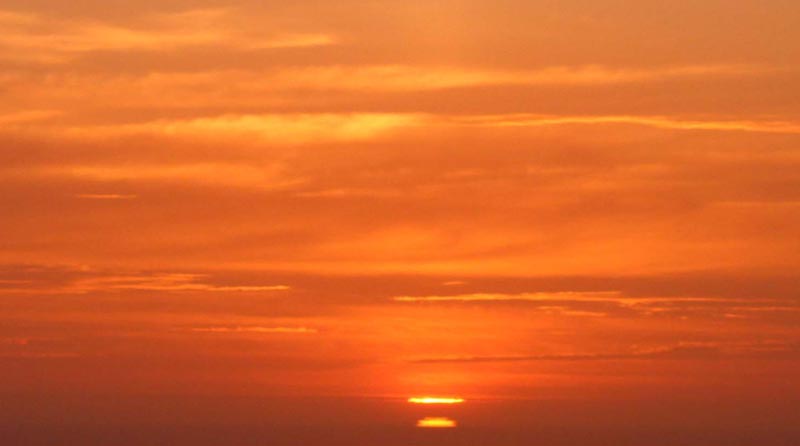
Novaya Zemlya / Oregon Coast Beach Connection
He said it's very much related to the Novaya Zemlya effect, which is an exceptionally cool sight where the sunset appears to be two-headed or three-headed or even more. It's a subtle one that people don't often recognize; they don't realize what they're really looking at. The sun is being projected above itself.
“Both occur due to refraction of sunlight through multiple temperature layers of the atmosphere,” Nieuwenhuis said. “In the case of Novaya Zemlya effect, the atmosphere acts more like a lens, bending the light around the horizon, allowing the sun to appear above the horizon when it really isn't.”
Both of them require inversion layers in the atmosphere, which usually just happens on clear, stable days, he said.
“They also work best with a clear, unobstructed horizon, which our coast provides in abundance for sunsets,” Nieuwenhuis said.
There's also a lot of talk in the science community that the Novaya Zemlya is rather rare – or it certainly was when it was first named centuries ago. Nieuwenhuis didn't really know for sure if it is considered rare, but if it is then the Oregon coast has something special and it doesn't even know it.
“Am not sure if it is considered rare in occurrence, but it does seem to be uncommon purely based on where you have to be to see it: clear horizon through a strong inversion layer,” he said. “Our coast frequently features both of those at sunset, so maybe not so rare here? It does seem to occur most often in the polar regions.”
Here's one seriously cool tidbit that few seem to note: the Novaya can display a green flash as well. That's something echoed by Nieuwenhuis. It's much harder to see, but make sure you look closely at the sunset when you see the Novaya happening.
More Strange Weather Cousins on the Oregon Coast: Green Flash and the Novaya Zemlya
The conventional wisdom has been that you'll see a green flash with no clouds between you and the sun. However, Hayslip's shot and the Novaya Zemlya prove there's more to it than a vacant sky.
Oregon Coast Hotels for this event - South Coast Hotels - Oregon Coast Vacation Rentals - Where to eat - Maps - Virtual Tours
Cannon Beach Lodging
Nehalem Bay Lodgings
Manzanita Hotels, Lodging
Three Capes Lodging
Pacific City Hotels, Lodging
Lincoln City Lodging
Depoe Bay Lodging
Newport Lodging
Waldport Lodging
Yachats Lodging
Oregon Coast Vacation Rentals
Oregon Coast Lodging Specials
More About Oregon Coast hotels, lodging.....
More About Oregon Coast Restaurants, Dining.....
 Andre' GW Hagestedt is editor, owner and primary photographer / videographer of Oregon Coast Beach Connection, an online publication that sees over 1 million pageviews per month. He is also author of several books about the coast.
Andre' GW Hagestedt is editor, owner and primary photographer / videographer of Oregon Coast Beach Connection, an online publication that sees over 1 million pageviews per month. He is also author of several books about the coast.
LATEST Related Oregon Coast Articles
Floating Beacons of the N. Oregon Coast: Astoria's Lightship Columbia History...History and Hops in Seaside looks to the lightship on Dec 18. Seaside events
Fiery High-Speed Chase on Oregon Coast: More Revealed on How It Began
Suspect had allegedly robbed a business in Waldport, more. Newport, Depoe Bay, Lincoln City. History
Last Night's Aurora Shots from Oregon Coast
A strong storm seen from Newport, Bandon, Port Angeles, Florence, Pacific City, Cannon Beach and more. Astronomy. Sciences
Oregon Coast's Crabbing Fleet Heads Out with Whale Entanglement Advisory
Environmental groups petition ODFW for greater whale safety measures. Marine sciences
Rockaway Beach Hotel News: New Inn Near Rockaway Beach is Really 100 Years Old
Boutique inn and BnB on north Oregon coastin a forest, marvelous details; bathroom vanities created by local craftsmen, headboards made of live edge wood. Pets. Rockaway Beach Hotel Reviews
Newport Police Investigate Two Stabbings and a Shooting Near Oregon Coast's H...
A man was shot as he was allegedly stabbing his second victim
Lassoing a Wayward Sea Lion Just Part of the Gig for Oregon Coast Deputies
Sea lion wandering near Newport / South Beach streets got some interesting looks. Marine sciences
Reports of Bird Flu in Washington, Oregon Include Coastlines: States Issue Ad...
One large-scale report from Long Beach still to be determined. Marine sciences
Back to Oregon Coast
Contact Advertise on Oregon Coast Beach Connection
All Content, unless otherwise attributed, copyright © Oregon Coast Beach Connection. Unauthorized use or publication is not permitted





